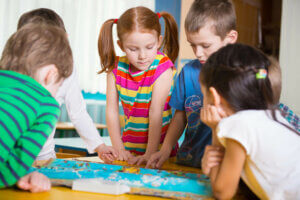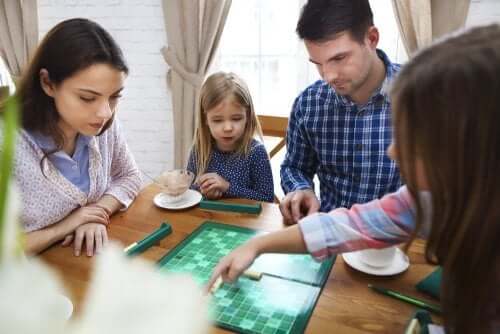Games that Help Improve Spelling in Children

Reading and writing are two basic abilities when it comes to communication and learning. In fact, today, these skills are an absolutely essential factor when it comes to living in society. Therefore, it’s important that children acquire a good level of competence that allows them, among other things, to understand and master the spelling rules of a language. To make this more fun, we want to tell you about two games that help improve spelling in children.
It’s important to remember that children experience the most significant learning when they take part in fun and entertaining activities.
“Spelling isn’t a fad that changes along with trends; Writing well is synonymous with culture and education.”
– Anonymous –
Learning while having fun: Games that help improve spelling in children
Play and learning have the following two aspects in common:
- Improvement.
- Practice.
- The acquisition of abilities and competencies.
Therefore, it makes sense to combine play and learning in order to guarantee maximum teaching effectiveness. So, we can say that games are a didactic method for learning while having fun at the same time. What’s more, playing involves many other components that are also beneficial to learning, as it promotes the following:

- The creation of an informal, relaxed environment.
- Increased motivation and interest in the task.
- Increased levels of concentration and attention.
- A more active and participative attitude.
- Increased memory ability.
- The boosting of self-confidence.
- Increased creativity and imagination.
- The development of social skills.
- The creation of opportunities for communication.
In short, games boost meaningful and autonomous learning. Therefore, by means of playful and practical activities, children are able to better retain the rules of spelling. In fact, according to author Arno Giovannini, human beings memorize:
- 90% of what they experience and do.
- 70% of what other people explain to them.
- 30% of what they observe.
- 20% of what they hear.
“Play is our brain’s favorite way of learning.”
– Diane Ackerman –
3 games that help improve spelling in children
Scrabble
Scrabble consists of creating different words using different letters while obeying two simple rules:
- The words must appear in the dictionary.
- Words must be spelled correctly.
In order to begin, each player picks up a series of letters at random from a pile that’s scattered face down on the table. Each letter has a point value which then gives value to each word that players form.
So, the player who adds up the most points with the words he or she constructs on the playing board wins. The points that players earn over the course of the game will depend on the following factors:

- How many words they create.
- The length of the words they create.
- How much each letter they use to create their words is worth.
- The placement of the letters on the board (some spots on the board offer extra points).
As you can see, this famous classic board game is especially useful for putting spelling rules into practice. What’s more, there are a variety of versions of Scrabble that adapt to every age. So, as soon as children learn to read, they can start playing this wonderful game.
Spelling bee
Spelling words out loud is the perfect way to assimilate how to spell a word correctly. The best way to go about it is to form a contest at home or at school.
For example, you can create a competition where the level of difficulty gradually increases. Kids see this as an attractive challenge, so it ends up being both entertaining and motivational.
“To learn to read is to light a fire; every syllable that is spelled out is a spark.”
– Victor Hugo –
Reading and writing are two basic abilities when it comes to communication and learning. In fact, today, these skills are an absolutely essential factor when it comes to living in society. Therefore, it’s important that children acquire a good level of competence that allows them, among other things, to understand and master the spelling rules of a language. To make this more fun, we want to tell you about two games that help improve spelling in children.
It’s important to remember that children experience the most significant learning when they take part in fun and entertaining activities.
“Spelling isn’t a fad that changes along with trends; Writing well is synonymous with culture and education.”
– Anonymous –
Learning while having fun: Games that help improve spelling in children
Play and learning have the following two aspects in common:
- Improvement.
- Practice.
- The acquisition of abilities and competencies.
Therefore, it makes sense to combine play and learning in order to guarantee maximum teaching effectiveness. So, we can say that games are a didactic method for learning while having fun at the same time. What’s more, playing involves many other components that are also beneficial to learning, as it promotes the following:

- The creation of an informal, relaxed environment.
- Increased motivation and interest in the task.
- Increased levels of concentration and attention.
- A more active and participative attitude.
- Increased memory ability.
- The boosting of self-confidence.
- Increased creativity and imagination.
- The development of social skills.
- The creation of opportunities for communication.
In short, games boost meaningful and autonomous learning. Therefore, by means of playful and practical activities, children are able to better retain the rules of spelling. In fact, according to author Arno Giovannini, human beings memorize:
- 90% of what they experience and do.
- 70% of what other people explain to them.
- 30% of what they observe.
- 20% of what they hear.
“Play is our brain’s favorite way of learning.”
– Diane Ackerman –
3 games that help improve spelling in children
Scrabble
Scrabble consists of creating different words using different letters while obeying two simple rules:
- The words must appear in the dictionary.
- Words must be spelled correctly.
In order to begin, each player picks up a series of letters at random from a pile that’s scattered face down on the table. Each letter has a point value which then gives value to each word that players form.
So, the player who adds up the most points with the words he or she constructs on the playing board wins. The points that players earn over the course of the game will depend on the following factors:

- How many words they create.
- The length of the words they create.
- How much each letter they use to create their words is worth.
- The placement of the letters on the board (some spots on the board offer extra points).
As you can see, this famous classic board game is especially useful for putting spelling rules into practice. What’s more, there are a variety of versions of Scrabble that adapt to every age. So, as soon as children learn to read, they can start playing this wonderful game.
Spelling bee
Spelling words out loud is the perfect way to assimilate how to spell a word correctly. The best way to go about it is to form a contest at home or at school.
For example, you can create a competition where the level of difficulty gradually increases. Kids see this as an attractive challenge, so it ends up being both entertaining and motivational.
“To learn to read is to light a fire; every syllable that is spelled out is a spark.”
– Victor Hugo –
All cited sources were thoroughly reviewed by our team to ensure their quality, reliability, currency, and validity. The bibliography of this article was considered reliable and of academic or scientific accuracy.
- Giovannini, A. et al. (1996). Profesor en acción 1. El proceso de aprendizaje. Madrid. Edelsa
- Sánchez, G. (2010). Las estrategias de aprendizaje a través del componente lúdico. Memoria de investigación, en MarcoELE. Suplementos, 11, 27-29.
This text is provided for informational purposes only and does not replace consultation with a professional. If in doubt, consult your specialist.








